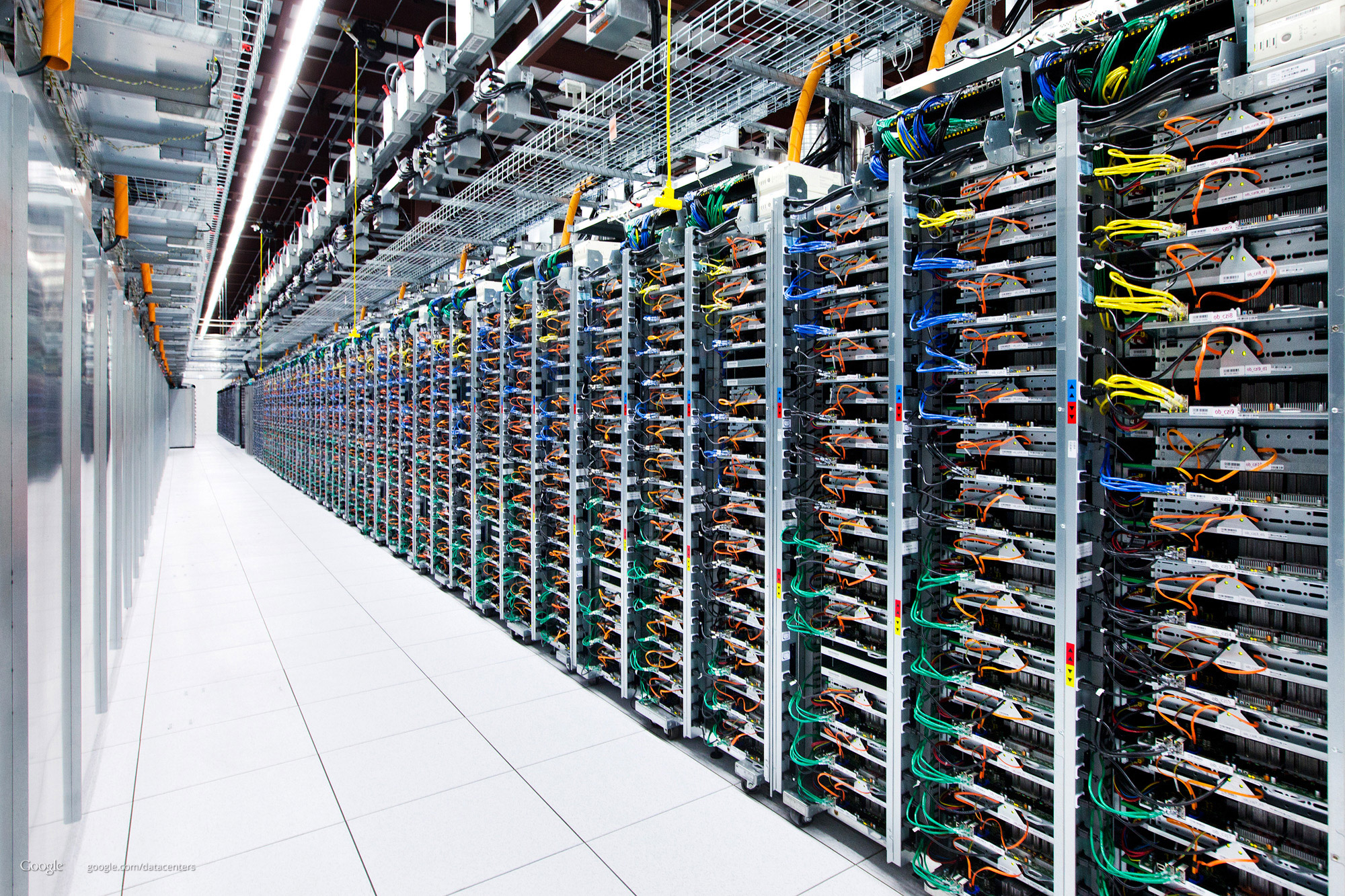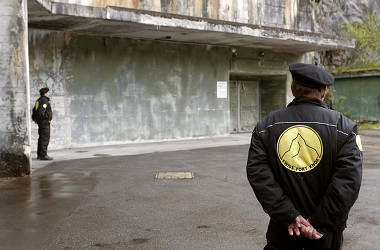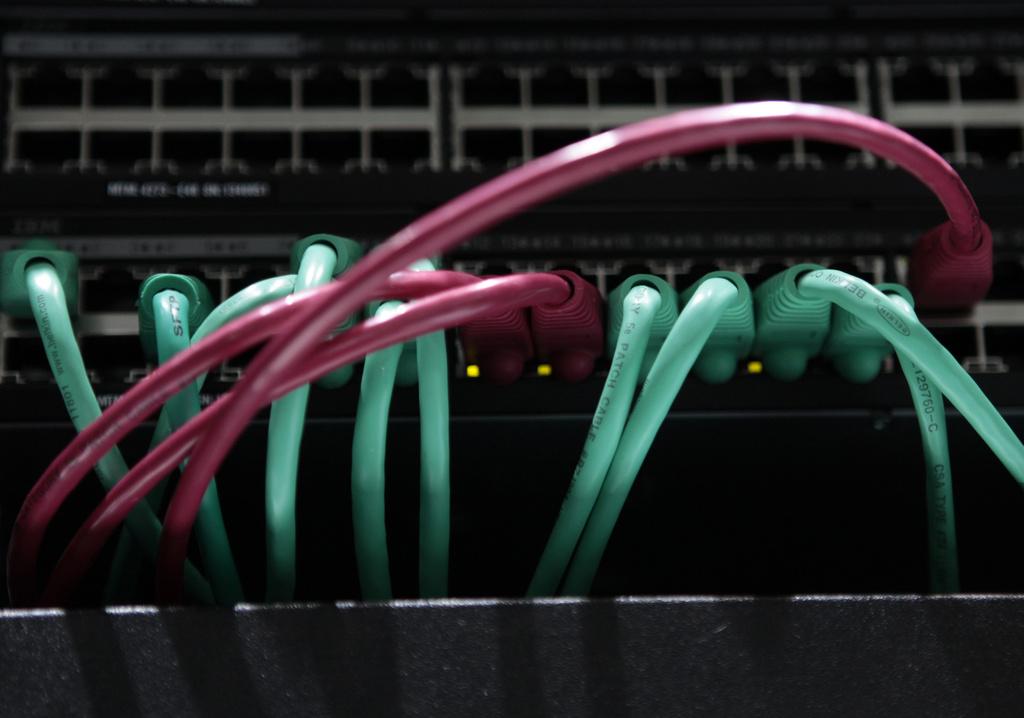Spying fears highlight worth of data centres

The granite grey slab of the Swisscom data centre outside Bern can protect its clients’ most valuable assets from bombs, earthquakes and even a direct aircraft hit. It’s only one of the reasons why there’s growing interest in such hubs.
The centre’s stark concrete vaults also protect the highly sensitive information of banks and other clients from the prying eyes of governments or economic spies. ‘Trust’ is the watchword of the expanding Swiss data storage industry as it quietly carves out a highly lucrative global niche.
Recent revelations of United States intelligence agency spying, coupled with ongoing reports of espionage emanating from China, may have raised public consciousness of the dangers to data but the industry has known about it for years.
At the Swisscom centre in Zollikofen, canton Bern, no stone has been left unturned to protect its valuable cargo from any form of threat. Six powerful diesel-powered generators are kept permanently warmed, ready to kick into life within 15 seconds and able to power the entire centre’s operations in the event of total power failure.
Thousands of video, heat and infra-red sensors would detect anyone who managed to get past the strict entrance security controls. Staffing is kept to a minimum, leaving the ranks of servers unmolested.
Enquiries related to encryption techniques and other measures to prevent cyber intrusion are met with a polite but firm “no comment”.
Political stability, a tradition of confidentiality and strong data protection laws have all added to Switzerland’s growing reputation as an international data safe house. Unlike in the US, even the Swiss government would need a court to approve each request for data.
“Clients increasingly want to entrust their data to a jurisdiction where there is legal certainty,” Bruno Messmer, head of sourcing consulting at Swisscom, told swissinfo.ch. “This will be one of Switzerland’s many strong selling points in the future.”
Earlier this month, former employee of the US intelligence operation the National Security Agency (NSA) Edward Snowden, leaked details of intrusive surveillance techniques to the media.
He claimed that the NSA had brokered deals with large telephone and computer services companies to gain “back door” access to personal information held in their files.
In addition, Snowden said he worked as a spy whilst under diplomatic cover in Geneva from 2007.
The revelations have sparked widespread global condemnation, not least from Switzerland that has demanded details from the US of its operations carried out on Swiss soil.
Snowden remains a fugitive from the US at an unknown location, having first spent some time in Hong Kong.
Expansion
Some data storage providers have taken security to extremes, housing their servers in ex-military alpine bunkers, such as the aptly-named ‘Fort Knox’ in canton Bern. One company using the bunker, Siag – which labels itself the “Swiss private bank for digital assets” – refuses to deal with US clients on security grounds.
“We decided 10 years ago not to deliver data to the US because we knew we could not do it without giving [the US intelligence agencies] a back door [access to this data],” Siag chief executive Christoph Oschwald told swissinfo.ch.
While Switzerland is a relative minnow in the data storage industry compared to the US or Britain it will still carve out some 160,000 square metres of secure space by the end of this year, expanding to more than 200,000 by 2016, according to market research consultants Broadgroup.
This equates to the second densest data storage capacity per capita in Europe, second only to Ireland. The comparison between the two countries is no accident as both compete to attract multinational company HQs to their borders.
“The broad benefits that Switzerland offers as a location for companies, such as tax, skilled labour, a stable economy and reliable legal situation, also attracts data,” Broadgroup managing director Steve Wallage told swissinfo.ch.
“In many cases these companies like to set up their data centres within an hour’s drive from the office.”

More
Where Google stores your data
Green credentials
Relatively cheap and reliable energy supplies and a strong real estate market, that encourages investors to build in Switzerland, are also strong attractions.
In addition, some niche players have attracted business by displaying their green credentials. One of the biggest concerns for data centres is wastage with some two thirds of energy lost through heat.
The Swisscom Zollikofen centre, together with a sister centre in Bern, uses enough energy to power a 150,000 population town. Swisscom’s new building in the Bern suburb of Wankdorf will recycle that energy to heat new homes being built by the city.
The Green Data Center in Lupfig, canton Aargau, also employs heat exchangers to redirect lost energy to other buildings. It also boasts the latest power saving direct current (DC) technology and offers clients the option of using renewable only energy sources.
The sustainable energy is not just a green gimmick and would not attract clients purely on social grounds, Franz Grüter, chairman of the parent company green.ch told swissinfo.ch.
“Clients are not really interested in the latest cleantech technology unless you can show them it will save them money,” he said. “The less energy we waste, the less we have to use for cooling the servers. Our measures save us 20 per cent on our energy costs.”
The data storage industry in Switzerland faces some challenges ahead, not least because it has limited space and tough planning procedures. The future supply of cost efficient energy is under some doubt after Switzerland’s decision to scrap its nuclear power stations and the handover of banking data to the US has undermined its reputation for confidentiality.
But the recent tales of US intelligence data espionage might make up for that to some degree, according to Broadgroup’s Steve Wallage.
“Several Middle East companies have already targeted Switzerland because they distrust the US,” he told swissinfo.ch. “The stories coming from the US have chipped away at people’s confidence and that could be good news for a market like Switzerland.”
The US stores far more data than any other country, according to research by Broadgroup Consulting that puts the current space devoted to storage in the US at 8.5 million square metres.
In Canada the figure is 800,000 square metres.
A recent study of Western Europe by Broadgroup showed London, Frankfurt, Paris and Amsterdam to be the biggest locations for data storage.
Dublin, Geneva and Zurich form the next band of important players.
Swiss data storage increasing from 123,000m2 in 2011 to 160,000m2 by the end of this year and a forecast 200,000m2 by the end of 2016.
By the end of this year, Britain will have 687,000 m2 available for data storage, Germany 600,000m2, France 380,000m2, the Netherlands 320,000m2 and Ireland 100,000m2.

In compliance with the JTI standards
More: SWI swissinfo.ch certified by the Journalism Trust Initiative












You can find an overview of ongoing debates with our journalists here . Please join us!
If you want to start a conversation about a topic raised in this article or want to report factual errors, email us at english@swissinfo.ch.